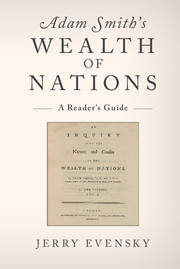Book contents
- Frontmatter
- Contents
- Acknowledgments
- Prologue: The Purpose of This Work
- 1 Adam Smith's Moral Philosophical Vision: The Context of His Economic Analysis
- 2 The Wealth of Nations: Book I
- 3 The Wealth of Nations: Books II and III
- 4 The Wealth of Nations: Book IV
- 5 The Wealth of Nations: Book V
- Epilogue: Adam Smith and Laissez-Faire
- References
- Index
Prologue: The Purpose of This Work
Published online by Cambridge University Press: 05 September 2015
- Frontmatter
- Contents
- Acknowledgments
- Prologue: The Purpose of This Work
- 1 Adam Smith's Moral Philosophical Vision: The Context of His Economic Analysis
- 2 The Wealth of Nations: Book I
- 3 The Wealth of Nations: Books II and III
- 4 The Wealth of Nations: Book IV
- 5 The Wealth of Nations: Book V
- Epilogue: Adam Smith and Laissez-Faire
- References
- Index
Summary
My subject is Adam Smith's economics as he presents it in his Inquiry into the Nature and Causes of the Wealth of Nations (sometimes abbreviated WN in what follows).
Smith's rhetorical strategy in The Wealth of Nations is to lay out his narrative in a stepwise process of analytical presentation, empirical persuasion, and policy implications.
There are five “Books” in WN. Smith begins his analytical presentation in Book I, defining his terms and arranging them into statements about economic processes. In Book II he turns to the dynamics of economics systems, analyzing how and why the wealth of a nation grows, stagnates, or declines. In Book III he offers an empirical case for his model by demonstrating the power of his analysis to explain both the twists and turns and the long view of humankind's history.
Having presented his model and made his empirical case for it, in Book IV Smith examines two alternative models, Mercantilism and Physiocracy, highlighting their weaknesses and the perverse consequences of their application as policy. Finally, in Book V Smith turns to the policy implications of his own analysis, offering his perspective on the role of government in a liberal society with a special emphasis on the importance of establishing security and justice, providing public goods, optimal revenue generation, and properly aligning incentives.
The Wealth of Nations (first edition published in 1776) is one piece of Smith's planned body of work that was to offer a moral philosophical (a holistic) analysis of the human condition. He makes this agenda clear in the original “Advertisement” to the first published piece in this analysis, the first edition (1759) of his Theory of Moral Sentiments. Therein he tells us that there are more dimensions of his analysis yet to be written concerning law and government (never written, but his Lectures on Jurisprudence reflect his thinking on this dimension) and economics (realized in WN).
- Type
- Chapter
- Information
- Adam Smith's Wealth of NationsA Reader's Guide, pp. 1 - 6Publisher: Cambridge University PressPrint publication year: 2015



